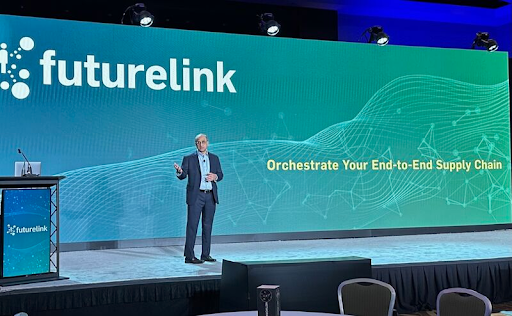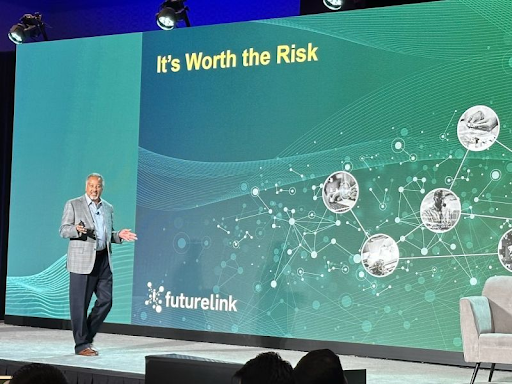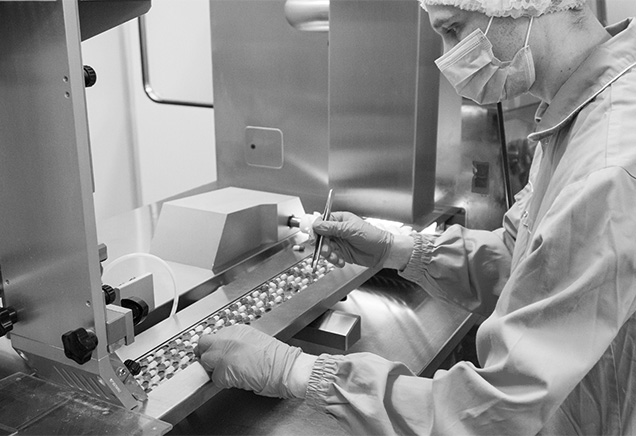Table of contents
Nearly 200 pharmaceutical and healthcare industry business leaders representing more than 75 organizations descended on Boston in May for FutureLink 2023, the world's premier supply chain business conference hosted by TraceLink.
The event was designed for pharma, distribution, logistics, and healthcare industry professionals looking to capitalize on the benefits of traceability, compliance, collaboration, and intelligence gleaned from shared efforts to enable end-to-end supply chain digitization. Featuring more than 50 insightful sessions, FutureLink 2023 provided guidance and best practices for using a digital network platform for tangible business benefits while simultaneously complying with critical regulatory requirements to safeguard patient access to medicines.
"For me, the value of attending FutureLink is to keep up to date with what's going on in the innovation space of the supply chain," George Llado, former SVP/CIO, Alexion Pharmaceuticals.
Attendees walked away with the knowledge needed to accelerate their readiness for the final phase of the U.S. Drug Supply Chain Security Act (DSCSA), which goes into effect in November, as well as expert insights on how to improve supply chain visibility and enable real-time collaboration with partners. Here's a quick look at some of the FutureLink 2023 highlights.
The role of digitalization in streamlining supply chain orchestration, DSCSA compliance, and more
TraceLink CEO Shabbir Dahod opened FutureLink 2023 with his keynote, “End-to-End Product and Patient Orchestration: Making Supply Chain Digitalization a Strategic Asset.” Dahod emphasized that achieving compliance with track-and-trace requirements like DSCSA 2023 is just one reason to digitalize your supply chain on a network platform. The ability to integrate seamlessly with trading partners and share business information with 100% interoperability will also improve supply chain visibility, enable real-time collaboration, and help organizations reduce disruptions.
"All of you here have not just built a compliance solution, you are actually building the future of your supply chains right now," Dahod explained. "Track and trace is just the starting point for all of the other business value you're going to get."

The keynote was followed by a session featuring Eric Marshall, Executive Director of Partnership for DSCSA Governance, Inc., which develops industry-standard models for interoperable product tracing and verification. Marshall discussed expectations heading into the November 27, 2023 DSCSA deadline, as well as major DSCSA compliance challenges, such as the requirement for electronic and interoperable exchange of serialized Transaction Information (TI) and Transaction Statements (TS).
The PDG session was followed up with insight from industry professionals who have already started down the path of DSCSA compliance. “End-to-End Supply Chain Perspectives—Where Are We and What To Expect” featured a full panel of representatives spanning the complete end-to-end supply chain, from drug manufacturers (Merz) and contract manufacturers (Thermo Fisher) to distributors and wholesalers (Henry Schein and Value Drug) to pharmacies (Ardon Health), as they discussed their compliance journey.
The conversation then moved into what pharmaceutical supply chain professionals can do to better orchestrate end-to-end supply chain activity, from manufacturing to distribution to the end patient. Poor visibility and collaboration remain two of the biggest barriers to better supply chain orchestration, but these obstacles can be overcome by transforming the way organizations integrate people, processes, and systems across the end-to-end supply chain.
Better end-to-end supply chain orchestration starts with identifying the gaps that currently exist in your supply chain processes. “DSCSA Health Check: Themes, Best Practices, Learnings, and Examples” explored common gaps discovered in consultations with more than 30 different pharmaceutical companies and answered key questions around 3PL serialization requirements, serialized TI/TS data exchange and portal options, and handling DSCSA exceptions.
Then, TraceLink’s Adam Reczkowsk delivered “Powering Your Supply Chain with the TraceLink Network with ‘Integrate Once, Interoperate with Everyone.'” This session looked at the power of creating infinite supply chain connections through a single integration and how it dramatically simplifies processes that were traditionally very difficult, like using EDI. With the purpose-built TraceLink network, you can quickly build an integrated supply chain partner that connects you with more 290,000 pharmaceutical, distribution, and healthcare companies.
The rest of the day was spent delving into regional track-and-trace and serialization compliance requirements. There were two core tracks:
- Track 1: This track was all about DSCSA, covering everything from exchanging EPCIS data for serialized products to managing DSCSA exceptions to operationalizing DSCSA compliance for the November 2023 deadline and beyond.
- Track 2: This track focused on the current and future outlook of global track-and-trace rules and requirements, and explored how to build a global compliance platform that could address mandates as they evolved.
How to realize end-to-end supply chain digitalization at your company
The first day of FutureLink 2023 was all about assessing the state of the industry and identifying the tools you need to achieve true end-to-end supply chain orchestration. The second day put that insight into action, exploring what you need to do to start transforming your supply chain and capitalizing on the value of supply chain digitalization.
Supply chain visionary George Llado, the former Senior Vice President and Chief Information Officer of Alexion Pharmaceuticals, kicked off the day with a discussion on leading supply chain digital transformation projects. He stressed the importance of taking risks, as it’s the best way to drive meaningful change within an organization.
“You have to trust your gut,” Llado asserted. “If you don’t take the risk, nothing happens... What I want to do is to challenge you to not be regular. Don’t stay within the confines of what your title is—you have to think different.”

Lucy Deus, Senior Vice President of Product Management at TraceLink, followed up with “Realizing End-to-End Product Orchestration for Collective Visibility, Agility, and Intelligence.” This session looked at how the TraceLink platform delivers key end-to-end supply chain capabilities that enable advanced supply chain activities like predicting drug shortages and enhancing drug recalls in ways that simply aren’t possible without a comprehensive network platform.
"When we think about enabling B2B digitalization, integration, and collaboration across companies, and how we as TraceLink can provide that foundation for end-to-end supply chain digitalization, we think about it in these terms," Deus said. "It's really about linking the people and the processes and the systems and the business enterprises and forming a collective information network."
The morning keynotes concluded with a fireside chat between OptumRx and TraceLink, looking at the impact of drug shortages on pharmacy dispensers. Leveraging DSCSA compliance data with new artificial intelligence and machine learning solutions can help to identify and mitigate potential drug shortages. TraceLink’s Bharath Sundararaman delved deeper into TraceLink Product Availability Intelligence in a subsequent session, exploring how TraceLink delivers collective intelligence to manage drug shortages and more.
The afternoon master class sessions offered even more actionable insight with a deep dive on DSCSA compliance and trading partner interoperability through the TraceLink network.
The conference then wrapped up with a general session that sought to answer the question, “Where do we go from here?” David Robertson, an author and MIT faculty member focused on innovation, framed the discussion in context of little ideas. Instead of pushing for one big radical innovation, he said, businesses can follow a more sustainable path forward by stringing together multiple small ideas. This path minimizes the negative impact and risk of disruption while still delivering big rewards.
While FutureLink 2023 has concluded, TraceLink is already in the process of planning FutureLink 2024, which will be held in both the United States and in Spain. If you joined us this year, we hope to see you again next year. And if you couldn’t make it this year, we encourage you to join us in 2024—there will be an entirely new slate of impactful and insightful programming that will help you acquire more value from your supply chain. Pharmaceutical companies and other supply chain participants can visit the FutureLink page to learn more or contact us for a private briefing.





